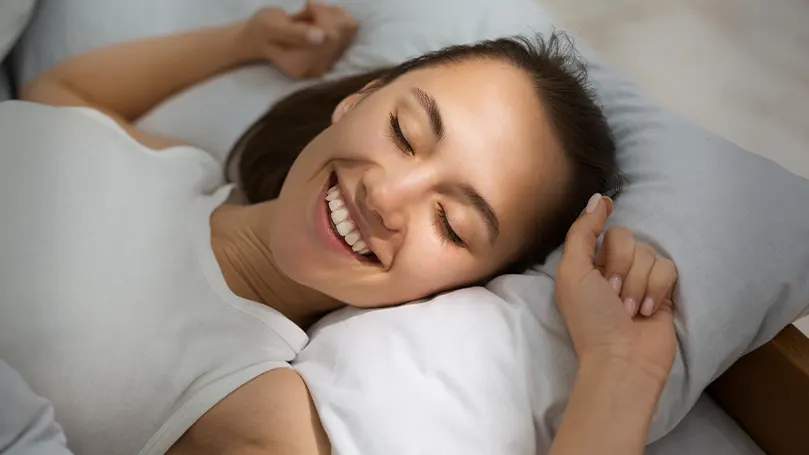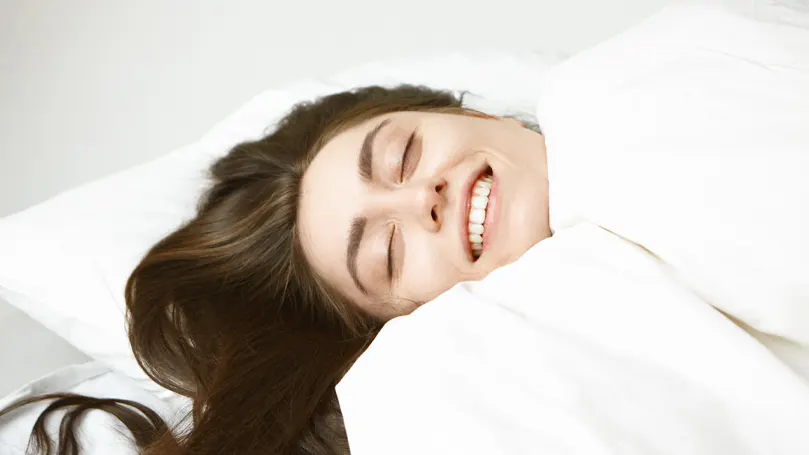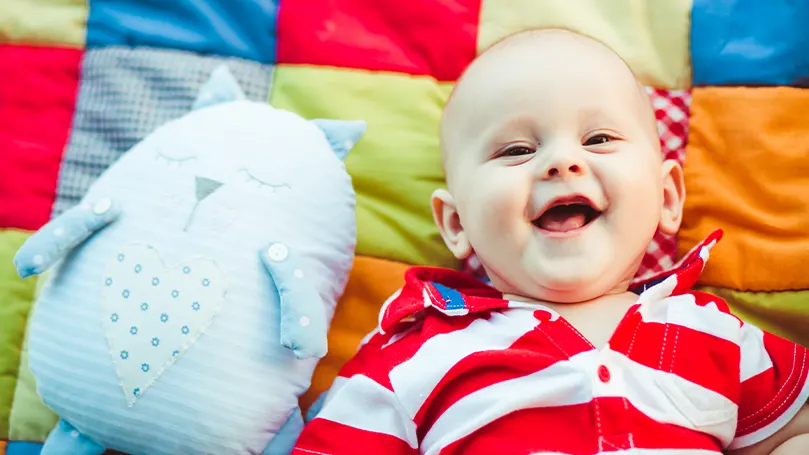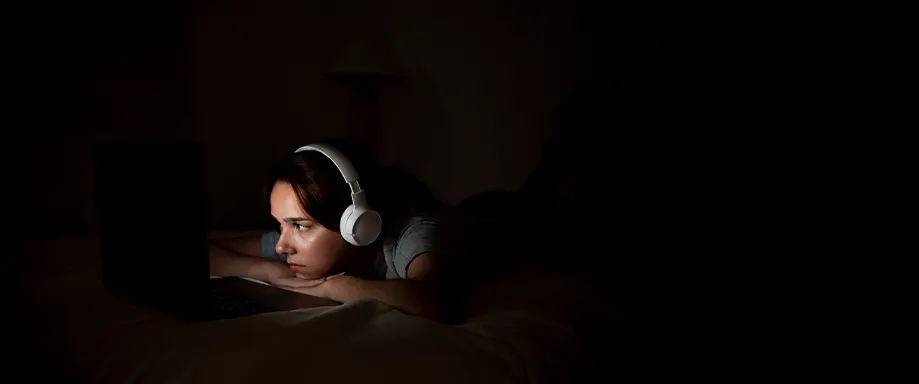Why are we laughing in our sleep?
Laughter is often considered to be the best medicine. It turns out that this may be true even while we are asleep.
To understand why we laugh in our sleep, we don't need to know all the brain basics nor the basics of the central nervous system, but we need to understand the two different types of sleep: rapid eye movement sleep (REM) and non-rapid eye movement sleep (NREM). During REM sleep, our brain activity increases, and this is the stage where most of our dreams occur. NREM sleep, on the other hand, is a kind of deeper sleep where our brain activity is much lower.
It's during REM sleep (or light sleep) that laughing in sleep usually occurs. Our brain is still active during this stage, and it's possible for us to experience emotions and even laugh. However, since our body is in a state of paralysis during REM sleep, we don't physically move or make any noise while we laugh in our sleep. So, no, in this stage, you will not experience sleep talking or walking nor even screaming after having a night terror. But, still, this is where sleep laughing appears. You can giggle for a short second or have a burst of uncontrolled laughter for several seconds.

Laughter in sleep is associated with emotions
But what causes us to laugh while visiting our dream world? The truth is, we don't always know. Sometimes we may be experiencing a funny dream while other times it may be related to our current state of mind. Laughter in sleep has been associated with a variety of emotions, including joy and happiness.
Interestingly, some research suggested that people who laugh more during waking hours are more likely to laugh in their sleep. This could be because their brain is more primed to experience positive emotions and react to them, even during sleep. So, if you turn around and see your sleep partner laughing during sleep, you are looking at a person who is most likely happy in his (her) waking life as well.
So, is laughing in sleep something to be concerned about? For most people, laughing in their sleep is completely harmless and not connected to any kind of sleep behavior disorder. However, in rare cases, this can be a sign of a sleep disorder, such as REM sleep behaviour disorder
Can laughing in sleep be associated with some neurological disorders or some underlying health condition?
Yes, laughing in sleep can sometimes be associated with neurological conditions.
One such condition is called “cataplexy,” which is a symptom of narcolepsy. Namely, narcolepsy is a sleep disorder that causes excessive daytime sleepiness and sudden sleep attacks. Cataplexy is one of the symptoms that can occur during waking hours or during active sleep.
Cataplexy involves a sudden loss of muscle tone, which can cause weakness or paralysis in the muscles. During the sleep cycle, this can manifest as laughing, as the muscles responsible for laughing may be affected. People with cataplexy may also experience other symptoms, such as slurred speech, drooping eyelids, or difficulty moving their limbs.

Another condition that can cause laughing while sleep is called “REM sleep behavior disorder” (RBD). RBD is a sleep disorder that involves acting out vivid, often violent dreams during REM sleep, also called sleep terrors. In some cases, laughing can be one of the behaviours exhibited during RBD.
It's important to note that while laughing in sleep can be a symptom of these neurological disorders affecting the muscles on our face, it's not always indicative of a problem. In most cases, this is completely normal and harmless. However, if you think that you have some of the mentioned REM sleep behavior disorders, it's always a good idea to speak to a healthcare professional.
What about babies laughing during sleep?
Babies are known for their adorable giggles and laughter, but have you ever wondered why they sometimes laugh in sleep? While we can't know for sure what babies are dreaming about, there are a few potential explanations for why babies laugh in their sleep.
One theory is that babies may be processing new information and experiences they've had while awake. Laughter is often associated with learning and exploration, and babies are constantly learning and experiencing new things. So, it's possible that their brain is processing these experiences during sleep (as soon as they start falling asleep until they wake up), which could result in laughter.
Another theory is that babies may be experiencing positive emotions in their dreams. Even at a young age, babies are capable of experiencing a range of emotions, including joy and happiness. So, it's possible that their dreams are eliciting these positive emotions and causing them to laugh in their sleep.

It's also worth noting that babies may be laughing in their sleep for no particular reason at all. They are just enjoying their sleep quality. Just like adults, babies can experience involuntary movements and vocalizations during sleep, and laughter may be one of them.
In most cases, laughing in sleep is completely normal and nothing to worry about – it is not a sign of a neurological disorder or some other sleep disorders. However, if you notice that your baby is laughing excessively or crying out in distress during sleep, it's always a good idea to talk to your healthcare provider to rule out any underlying issues.
Spiritual meanings of sleep laughing
Understanding sleep is not easy. There are people who have been dealing with sleep physiology their entire careers and sleep laughter is still a common phenomenon among all of them.
- Positive emotions: Laughing in sleep can simply indicate that the dreamer is experiencing something humorous or positive in their dream. It may be a sign of joy, happiness, or playfulness.
- Release of tension: Laughter is often seen as a way to release tension or stress. But in sleep may indicate that the dreamer is working through some emotional or psychological issues and using laughter as a coping mechanism.
- Unconscious processing: Dreams are thought to be a way for the brain to process and consolidate memories and emotions. Laughing in sleep may be a sign that the dreamer is processing some unconscious thoughts or feelings, and finding humour in the process.
- Spiritual or mystical experiences: In some spiritual or mystical traditions, sleep laughter can be interpreted as a sign of spiritual awakening, communication with higher realms or beings, or a manifestation of psychic abilities. Hint – this happens when you wake up from a strange dream.
Conclusion
In conclusion, laughing in sleep can be a fascinating and mysterious phenomenon that has been observed by people throughout history. While it can have various causes, including positive emotions, the release of tension, and unconscious processing, it's important to keep in mind that laughing in sleep can also be a symptom of sleep disorders or other medical conditions.
If you or someone you know is experiencing unusual sleep behaviours or other symptoms, it's always a good idea to seek medical advice. Ultimately, the meaning of laughing while sleep is highly individual and can be shaped by personal beliefs and experiences, making it a unique and intriguing aspect of human sleep and consciousness.














